Fleurs du Mal Magazine


Or see the index
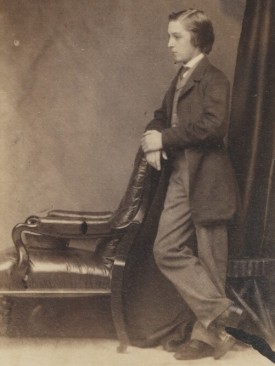
The child is father to the man
‘The child is father to the man.’
How can he be? The words are wild.
Suck any sense from that who can:
‘The child is father to the man.’
No; what the poet did write ran,
‘The man is father to the child.’
‘The child is father to the man!’
How can he be? The words are wild!
Gerard Manley Hopkins
(1844-1889)
‘The child is father to the man.’
• fleursdumal.nl magazine
More in: Archive G-H, Archive G-H, Hopkins, Gerard Manley
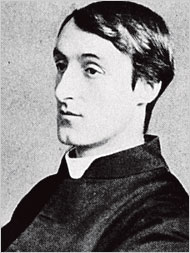
Nightfall
The times are nightfall, look, their light grows less;
The times are winter, watch, a world undone:
They waste, they wither worse; they as they run
Or bring more or more blazon man’s distress.
And I not help. Nor word now of success:
All is from wreck, here, there, to rescue one –
Work which to see scarce so much as begun
Makes welcome death, does dear forgetfulness.
Or what is else? There is your world within.
There rid the dragons, root out there the sin.
Your will is law in that small commonweal . . .
Gerard Manley Hopkins
(1844 – 1889)
Nightfall
• fleursdumal.nl magazine
More in: Archive G-H, Archive G-H, CLASSIC POETRY, Hopkins, Gerard Manley
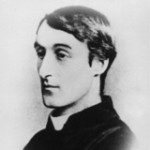
Gerard Manley Hopkins
(1844–89)
No worst, there is none. Pitched past pitch of grief
No worst, there is none. Pitched past pitch of grief,
More pangs will, schooled at forepangs, wilder wring.
Comforter, where, where is your comforting?
Mary, mother of us, where is your relief?
My cries heave, herds-long; huddle in a main, a chief
Woe, world-sorrow; on an age-old anvil wince and sing—
Then lull, then leave off. Fury had shrieked ‘No ling-
ering! Let me be fell: force I must be brief’.
O the mind, mind has mountains; cliffs of fall
Frightful, sheer, no-man-fathomed. Hold them cheap
May who ne’er hung there. Nor does long our small
Durance deal with that steep or deep. Here! creep,
Wretch, under a comfort serves in a whirlwind: all
Life death does end and each day dies with sleep
Gerard Manley Hopkins
fleursdumal.nl magazine
More in: Archive G-H, Hopkins, Gerard Manley
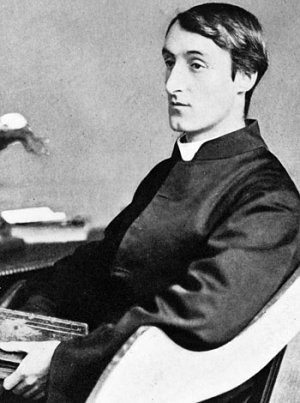
Gerard Manley Hopkins
(1844 – 1889)
The Alchemist in the City
My window shews the travelling clouds,
Leaves spent, new seasons, alter’d sky,
The making and the melting crowds:
The whole world passes; I stand by.
They do not waste their meted hours,
But men and masters plan and build:
I see the crowning of their towers,
And happy promises fulfill’d.
And I – perhaps if my intent
Could count on prediluvian age,
The labours I should then have spent
Might so attain their heritage,
But now before the pot can glow
With not to be discover’d gold,
At length the bellows shall not blow,
The furnace shall at last be cold.
Yet it is now too late to heal
The incapable and cumbrous shame
Which makes me when with men I deal
More powerless than the blind or lame.
No, I should love the city less
Even than this my thankless lore;
But I desire the wilderness
Or weeded landslips of the shore.
I walk my breezy belvedere
To watch the low or levant sun,
I see the city pigeons veer,
I mark the tower swallows run
Between the tower-top and the ground
Below me in the bearing air;
Then find in the horizon-round
One spot and hunger to be there.
And then I hate the most that lore
That holds no promise of success;
Then sweetest seems the houseless shore,
Then free and kind the wilderness,
Or ancient mounds that cover bones,
Or rocks where rockdoves do repair
And trees of terebinth and stones
And silence and a gulf of air.
There on a long and squared height
After the sunset I would lie,
And pierce the yellow waxen light
With free long looking, ere I die.
Gerard Manley Hopkins poetry
fleursdumal.nl magazine
More in: Archive G-H, Hopkins, Gerard Manley

Gerard Manley Hopkins
(1844 – 1889)
The Alchemist in the City
My window shews the travelling clouds,
Leaves spent, new seasons, alter’d sky,
The making and the melting crowds:
The whole world passes; I stand by.
They do not waste their meted hours,
But men and masters plan and build:
I see the crowning of their towers,
And happy promises fulfill’d.
And I – perhaps if my intent
Could count on prediluvian age,
The labours I should then have spent
Might so attain their heritage,
But now before the pot can glow
With not to be discover’d gold,
At length the bellows shall not blow,
The furnace shall at last be cold.
Yet it is now too late to heal
The incapable and cumbrous shame
Which makes me when with men I deal
More powerless than the blind or lame.
No, I should love the city less
Even than this my thankless lore;
But I desire the wilderness
Or weeded landslips of the shore.
I walk my breezy belvedere
To watch the low or levant sun,
I see the city pigeons veer,
I mark the tower swallows run
Between the tower-top and the ground
Below me in the bearing air;
Then find in the horizon-round
One spot and hunger to be there.
And then I hate the most that lore
That holds no promise of success;
Then sweetest seems the houseless shore,
Then free and kind the wilderness,
Or ancient mounds that cover bones,
Or rocks where rockdoves do repair
And trees of terebinth and stones
And silence and a gulf of air.
There on a long and squared height
After the sunset I would lie,
And pierce the yellow waxen light
With free long looking, ere I die.
Gerard Manley Hopkins poetry
kempis.nl poetry magazine
More in: Archive G-H, Hopkins, Gerard Manley
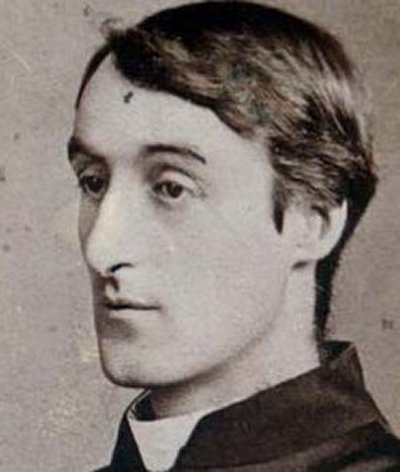
Gerard Manley Hopkins
(1844-1889)
Hurrahing in Harvest
Summer ends now; now, barbarous in beauty, the stocks rise
Around; up above, what wind-walks! what lovely behavior
Of silk-sack clouds! has wilder wilful-wavier
Meal-drift moulded ever and melted across skies?
I walk, I lift up, I lift up heart, eyes
Down all that glory in the heavens to glean our Saviour,
And éyes, heárt, what looks, what lips, yet gave you a
Rapturous love’s greeting of realer, of rounder replies?
And the azurous hung hills are his world-wielding shoulder
Majestic – as a stallion, stalwart, very violet-sweet! –
These things, these things were here and but the beholder
Wanting; which two when they once meet,
The heart rears wings bold and bolder
And hurls for him, O half hurls earth for him off under his feet.
1877
Gerard Manley Hopkins
Opgetogen in oogsttijd
Zomer zinkt nu; nu, schaamteloos schoon, zie schoven staan
Verspreid; daar omhoog, welk ‘n wind-waas! niet lieflijk milder
Kon ‘t zijde-zwerk zijn! is ‘n welbewust-welvender wilder
Meel-drift ooit gevormd en gesmolten in d’ hemelbaan?
Ik loop, ik richt op, ik richt op hart, oog
Langs al dat heil in ‘t firmament om d’ Heiland te lezen,
En óóg, hárt, welke blik, welke lip, gaf jullie ooit, dan deze,
Verrukter liefdesrespons in raker, in ronder vertoog?
En de hemelblauwe heuvels zijn, O hoe verheven,
Z’n aard-torsende torso – als ‘n ruige ruin, zeer lila zoet! –
Deez’ dingen, deez’ dingen waren hier, maar bleven
Zonder beschouwer; eenmaal elkaar ontmoet,
Voedt het hart vleugels gedreven, meer gedreven
En zwiept voor hem, O half zwiept voor hem aard vanonder z’n voet.
Vertaling Cornelis W. Schoneveld
Uit: Bestorm mijn hart, de beste Engelse gedichten uit de 16e-19e eeuw gekozen en vertaald door Cornelis W. Schoneveld, tweetalige editie. Rainbow Essentials no. 55, Uitgeverij Maarten Muntinga, Amsterdam, 2008, 296 pp, € 9,95 ISBN: 9789041740588
kempis.nl poetry magazine
More in: Archive G-H, Hopkins, Gerard Manley, More translations
.jpg)
Gerard Manley Hopkins
(1844-1889)
Barnfloor and Winepress
And he said, If the Lord do not help thee, whence shall I help thee? out of the barnfloor, or out of the winepress? ( 2 Kings VI: 27)
Thou that on sin’s wages starvest,
Behold we have the joy in harvest:
For us was gather’d the first fruits,
For us was lifted from the roots,
Sheaved in cruel bands, bruised sore,
Scourged upon the threshing-floor;
Where the upper mill-stone roof’d His head,
At morn we found the heavenly Bread,
And, on a thousand altars laid,
Christ our Sacrifice is made!
Thou whose dry plot for moisture gapes,
We shout with them that tread the grapes:
For us the Vine was fenced with thorn,
Five ways the precious branches torn;
Terrible fruit was on the tree
In the acre of Gethsemane;
For us by Calvary’s distress
The wine was racked from the press;
Now in our altar-vessels stored
Is the sweet Vintage of our Lord.
In Joseph’s garden they threw by
The riv’n Vine, leafless, lifeless, dry:
On Easter morn the Tree was forth,
In forty days reach’d heaven from earth;
Soon the whole world is overspread;
Ye weary, come into the shade.
The field where He has planted us
Shall shake her fruit as Libanus,
When He has sheaved us in His sheaf,
When He has made us bear his leaf. –
We scarcely call that banquet food,
But even our Saviour’s and our blood,
We are so grafted on His wood.
![]()
Gerard Manley Hopkins poetry
kempis poetry magazine
More in: Hopkins, Gerard Manley

Gerard Manley Hopkins
(1844-1889)
The Blessed Virgin Compared to the Air We Breathe
Wild air, world-mothering air,
Nestling me everywhere,
That each eyelash or hair
Girdles; goes home betwixt
The fleeciest, frailest-flixed
Snowflake; that ’s fairly mixed
With, riddles, and is rife
In every least thing’s life;
This needful, never spent,
And nursing element;
My more than meat and drink,
My meal at every wink;
This air, which, by life’s law,
My lung must draw and draw
Now but to breathe its praise,
Minds me in many ways
Of her who not only
Gave God’s infinity
Dwindled to infancy
Welcome in womb and breast,
Birth, milk, and all the rest
But mothers each new grace
That does now reach our race—
Mary Immaculate,
Merely a woman, yet
Whose presence, power is
Great as no goddess’s
Was deemèd, dreamèd; who
This one work has to do—
Let all God’s glory through,
God’s glory which would go
Through her and from her flow
Off, and no way but so.
I say that we are wound
With mercy round and round
As if with air: the same
Is Mary, more by name.
She, wild web, wondrous robe,
Mantles the guilty globe,
Since God has let dispense
Her prayers his providence:
Nay, more than almoner,
The sweet alms’ self is her
And men are meant to share
Her life as life does air.
If I have understood,
She holds high motherhood
Towards all our ghostly good
And plays in grace her part
About man’s beating heart,
Laying, like air’s fine flood,
The deathdance in his blood;
Yet no part but what will
Be Christ our Saviour still.
Of her flesh he took flesh:
He does take fresh and fresh,
Though much the mystery how,
Not flesh but spirit now
And makes, O marvellous!
New Nazareths in us,
Where she shall yet conceive
Him, morning, noon, and eve;
New Bethlems, and he born
There, evening, noon, and morn—
Bethlem or Nazareth,
Men here may draw like breath
More Christ and baffle death;
Who, born so, comes to be
New self and nobler me
In each one and each one
More makes, when all is done,
Both God’s and Mary’s Son.
Again, look overhead
How air is azurèd;
O how! nay do but stand
Where you can lift your hand
Skywards: rich, rich it laps
Round the four fingergaps.
Yet such a sapphire-shot,
Charged, steepèd sky will not
Stain light. Yea, mark you this:
It does no prejudice.
The glass-blue days are those
When every colour glows,
Each shape and shadow shows.
Blue be it: this blue heaven
The seven or seven times seven
Hued sunbeam will transmit
Perfect, not alter it.
Or if there does some soft,
On things aloof, aloft,
Bloom breathe, that one breath more
Earth is the fairer for.
Whereas did air not make
This bath of blue and slake
His fire, the sun would shake,
A blear and blinding ball
With blackness bound, and all
The thick stars round him roll
Flashing like flecks of coal,
Quartz-fret, or sparks of salt,
In grimy vasty vault.
So God was god of old:
A mother came to mould
Those limbs like ours which are
What must make our daystar
Much dearer to mankind;
Whose glory bare would blind
Or less would win man’s mind.
Through her we may see him
Made sweeter, not made dim,
And her hand leaves his light
Sifted to suit our sight.
Be thou then, O thou dear
Mother, my atmosphere;
My happier world, wherein
To wend and meet no sin;
Above me, round me lie
Fronting my froward eye
With sweet and scarless sky;
Stir in my ears, speak there
Of God’s love, O live air,
Of patience, penance, prayer:
World-mothering air, air wild,
Wound with thee, in thee isled,
Fold home, fast fold thy child
![]()
Gerard Manley Hopkins poetry
kempis poetry magazine
More in: Hopkins, Gerard Manley
.jpg)
Gerard Manley Hopkins
(1844-1889)
Spring and Fall
To a young child
Margaret, are you grieving
Over Goldengrove unleaving?
Leaves, like the things of man, you
With your fresh thoughts care for, can you?
Ah! as the heart grows older
It will come to such sights colder
By and by, nor spare a sigh
Though worlds of wanwood leafmeal lie;
And yet you will weep and know why.
Now no matter, child, the name:
Sorrow’s springs are the same.
Nor mouth had, no nor mind, expressed
What heart heard of, ghost guessed:
It is the blight man was born for,
It is Margaret you mourn for.
![]()
Gerard Manley Hopkins poetry
fleursdumal.nl magazine
More in: # Classic Poetry Archive, 4SEASONS#Spring, Archive G-H, Archive G-H, Hopkins, Gerard Manley
.jpg)
Gerard Manley Hopkins
(1844-1889)
Moonrise
I awoke in the Midsummer not to call night, in the white and the walk of the morning:
The moon, dwindled and thinned to the fringe of a finger-nail held to the candle,
Or paring of paradisaical fruit, lovely in waning but lustreless,
Stepped from the stool, drew back from the barrow, of dark Maenefa the mountain;
A cusp still clasped him, a fluke yet fanged him, entangled him, not quite utterly.
This was the prized, the desirable sight, unsought, presented so easily,
Peace
When will you ever, Peace, wild wooddove, shy wings shut,
Your round me roaming end, and under be my boughs?
When, when, Peace, will you, Peace? I’ll not play hypocrite
To own my heart: I yield you do come sometimes; but
That piecemeal peace is poor peace. What pure peace allows
Alarms of wars, the daunting wars, the death of it?
O surely, reaving Peace, my Lord should leave in lieu
Some good! And so he does leave Patience exquisite,
That plumes to Peace thereafter. And when Peace here does house
He comes with work to do, he does not come to coo,
He comes to brood and sit.
Summa
The best ideal is the true
And other truth is none.
All glory be ascribèd to
The holy Three in One.
![]()
Gerard Manley Hopkins poetry
kempis poetry magazine
More in: Hopkins, Gerard Manley
.jpg)
Gerard Manley Hopkins
(1844-1889)
The Handsome Heart
at a Gracious Answer
‘But tell me, child, your choice; what shall I buy
You?’—‘Father, what you buy me I like best.’
With the sweetest air that said, still plied and pressed,
He swung to his first poised purport of reply.
What the heart is! which, like carriers let fly—
Doff darkness, homing nature knows the rest—
To its own fine function, wild and self-instressed,
Falls light as ten years long taught how to and why.
Mannerly-hearted! more than handsome face—
Beauty’s bearing or muse of mounting vein,
All, in this case, bathed in high hallowing grace…
Of heaven what boon to buy you, boy, or gain
Not granted?—Only … O on that path you pace
Run all your race, O brace sterner that strain!
![]()
Gerard Manley Hopkins poetry
kempis poetry magazine
More in: Hopkins, Gerard Manley
.jpg)
G e r a r d M a n l e y H o p k i n s
(1844-1889)
H e n r y P u r c e l l
The poet wishes well to the divine genius of Purcell and praises him that, whereas other musicians have given utterance to the moods of man’s mind, he has, beyond that, uttered in notes the very make and species of man as created both in him and in all men generally.
Have, fair fallen, O fair, fair have fallen, so dear
To me, so arch-especial a spirit as heaves in Henry Purcell,
An age is now since passed, since parted; with the reversal
Of the outward sentence low lays him, listed to a heresy, here.
Not mood in him nor meaning, proud fire or sacred fear,
Or love or pity or all that sweet notes not his might nursle:
It is the forgèd feature finds me; it is the rehearsal
Of own, of abrupt self there so thrusts on, so throngs the ear.
Let him Oh! with his air of angels then lift me, lay me! only I’ll
Have an eye to the sakes of him, quaint moonmarks, to his pelted plumage under
Wings: so some great stormfowl, whenever he has walked his while
The thunder-purple seabeach plumèd purple-of-thunder,
If a wuthering of his palmy snow-pinions scatter a colossal smile
Off him, but meaning motion fans fresh our wits with wonder.
![]()
Gerard Manley Hopkins poetry
kempis poetry magazine
More in: Hopkins, Gerard Manley
Thank you for reading Fleurs du Mal - magazine for art & literature